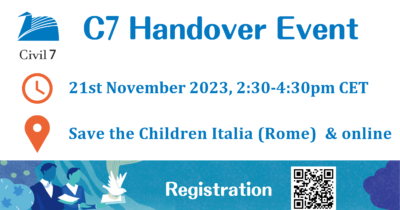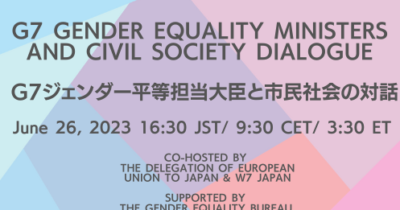Together with Citizens’ Summit 2023, C7 (Civil) published Citizens’ Declaration on Peace 2023 on 6 August, 78 years after the atomic bombing in Hiroshima. A press conference was held to explain the declaration and show CSOs’ willingness to engage with advocacy works to G7 governments and beyond.
“We have been disappointed to the outcome document of the G7 Leaders Summit in Hiroshima back in May 2023, on climate crisis, global health, economic inequality, humanitarian assistance, civic space and human rights, and especially nuclear disarmament. We will continue our advocacy on key development issues and peace towards G7 leaders, in 2024, when the Government of Italy will host the next G7 Summit in June“, said Aoi Horiuchi, Steering Committee of C7.
“Prime Minister Fumio Kishida’s remarks at the Peace Memorial Ceremony showed no strong desire or concrete plan for the abolition of nuclear weapons. The “Hiroshima Vision” adopted at the G7 Summit justifies nuclear deterrence head-on in a city that appeals to nuclear abolition as its only hope“, said Setsuko Thurlow, a Hibakusha (atomic bomb survivor) and a leading figure in the International Campaign to Abolish Nuclear Weapons (ICAN).
Akira Kawasaki, International Steering Group of ICAN and Executive Committee member of Peaceboat said, “the G7 has not created a timeline for nuclear abolition. We will encourage the government through a campaign for nuclear abolition in Japan“.
Tomoko Watanabe, Chair of ANT-Hiroshima, concluded that “Hiroshima was turned into a rental seat at the G7 summit. We will reclaim Hiroshima. We will think again, connect, gain strength, and act again“.
The press conference was held in Hiroshima NPO Center office at 10:00-12:00, on 6 August 2023, moderated by Hiroki Matsubara, Executive Director of Hiroshima NPO Center, as well as Steering Committee of C7.
Please refer to the statement (PDF) from here.

Citizens’ Declaration on Peace 2023
6 August 2023
Citizens’ Summit 2023
C7 (Civil)
This “Citizens Declaration on Peace 2023” is addressed by civil society organizations in and beyond Japan to appeal to world leaders and citizens to reconsider peace in light of the experience of the G7 Hiroshima Summit, and to realize it together.
We call on the G7 and other world leaders to make decisions and take action to ABOLISH nuclear weapons.
This year, the G7 Hiroshima Summit was held in Japan. In solidarity with a national and international civil society, we organized the Citizen’s Summit 2023 in Hiroshima in April. To tackle various social issues, including nuclear disarmament, climate change, conflict, inequality, gender, people with disabilities, childcare, youth, SDGs, public procurement, history of Hiroshima, disaster prevention, and the direction of the G7, we held discussions among citizens from various backgrounds. In addition, at the C7 (Civil7), one of the official engagement groups of the G7 process, we established six working groups with over 700 civil society representatives from 72 countries, including on nuclear disarmament, to engage in dialogue and to make policy recommendations to the G7.
However, the G7 Leaders’ Hiroshima Vision on Nuclear Disarmament issued by the G7 leaders was not what we – the citizens and Hibakusha, atomic bomb survivors, – expected, and we have to express our great disappointment and dismay. It might be premature to evaluate the G7 Hiroshima Summit at this point. It should also be noted that the variety of opinions on the evaluation of the Summit could be seen as a reflection of the civil society’s diversity, which we value. However, it was clear from the G7 Hiroshima Summit that the G7 leaders do not aim at the abolition of nuclear weapons, and they discussed the arms transfer rather than a ceasefire between Ukraine and Russia. In addition, seven organisations of Hiroshima Hibakusha have expressed regret that the bag containing the device that commands a nuclear attack, the “nuclear button”, was unabashedly brought into Hiroshima Peace Memorial Park, saying that this is a desecration and insult to the A- bombed city that tramples on the memorials of the A-bomb victims and their wish for nuclear weapons abolition.
It must be said that citizens are excluded from the democratic process and the will of the A-bomb survivors is neglected. Furthermore, in June, a sister park agreement between Hiroshima Peace Memorial Park and Pearl Harbor National Memorial was signed solely and hastily by the administrative decision, and many citizens do not understand this process and information. This is a crisis for the peace administration as the A-bombed city of Hiroshima.
As a result of these, the process of nuclear weapons abolition has regressed, and as citizens who have long appealed for the early abolition of nuclear weapons, we cannot accept the current situation. We continue to call on the Japanese Government and the nuclear-armed states to create a vision from nuclear disarmament to nuclear abolition and to sign and ratify the Prohibition of Nuclear Weapons (TPNW). And civil society will continue to be willing to engage in dialogue and policy cooperation with governments in order to realize a “sustainable society without nuclear weapons and leaving no one behind.”
Here, we would like to think and act together with all citizens of the world. Let us look at peace not only in the distance but also around us, redefine the peace we want, and act to achieve it.
While we hope for the abolition of nuclear weapons, nine states in the world possess nuclear weapons and there are an estimated 12,705 warheads on the planet. And the reality is that many countries including Japan are under the nuclear umbrella of the United States and others. In addition, nuclear weapons are not merely a security issue, but also complex and serious problems,
as citizens are living with nuclear threats, such as being actually affected by nuclear testing or nuclear power plant accidents all over the world.
Before the Leaders’ Summit, we, as C7, officially made the policy recommendations to the G7 on nuclear disarmament, climate and environmental justice, economic justice and transformation, global health, humanitarian assistance and conflict, and open and resilient society. Unfortunately, nevertheless, the G7 Hiroshima Summit Declaration did not incorporate many of the perspectives of civil society and was not something that citizens could appreciate. From a different perspective, it was an opportunity to reflect on the fact that civil society is still immature and is not yet fully equipped with the power and methods to improve our society. We have determined to improve and repeatedly build on this process. That is why the first step we propose is to redefine the citizens’ idea of ‘peace’ once again.
After 78 years since the atomic bombings, we wonder if the peace proclaimed by the Prime Ministers and mayors at the Peace Memorial Ceremony in Hiroshima and Nagasaki truly represents the voice of citizens. Let us think, speak out, and act together on what kind of peace we, as citizens, hope for, and what are needed to realize it.
We hope that this message will reach the leaders of the G7 and other countries, as well as citizens around the world, in order to create a sustainable society without nuclear weapons, where no one is left behind, with our own hands.
References:
Citizens’ Summit 2023
https://hiroshimacsummit2023.mystrikingly.com/
Civil7 2023 JAPAN
/
C7 Communiqué 2023
/wpC7/wp-content/uploads/2023/04/C7_communique2023_0412.pdf
G7 Hiroshima Leaders’ Communiqué
https://www.mofa.go.jp/files/100506878.pdf
G7 Leaders’ Hiroshima Vision on Nuclear Disarmament
https://www.mofa.go.jp/dns/ac_d/page1e_000679.html
Contact:
Hiroki Matsubara, Co-organizer, Citizens’ Summit 2023, [email protected]
Aoi Horiuchi, Steering Committee, Civil7, [email protected]




